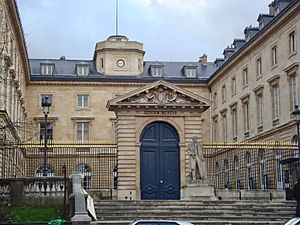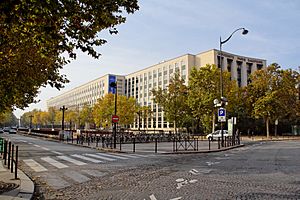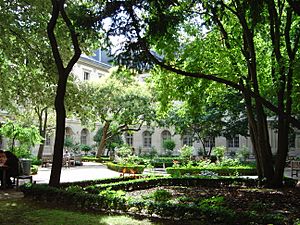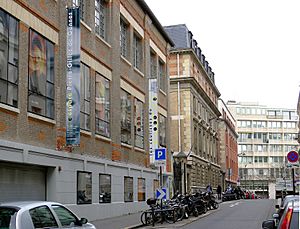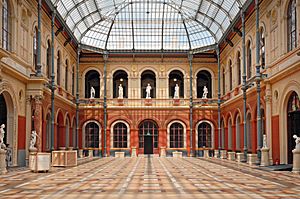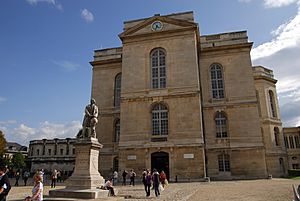Paris Sciences et Lettres University facts for kids
|
Université PSL
|
|
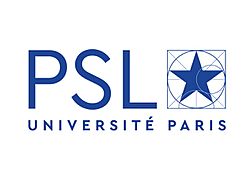 |
|
|
Other name
|
Paris Sciences et Lettres University |
|---|---|
| Motto | Sapere Aude |
|
Motto in English
|
Dare to know |
| Type | Public collegiate research university |
| Established | 2010 (1530 for its oldest constituent college, the Collège de France) |
|
Academic affiliation
|
Udice Group TPC |
| Endowment | €750 million |
| President | El-Mouhoub Mouhoud |
|
Academic staff
|
2,900 |
| Students | 17,000 |
| Location |
,
France
48°51′16.8″N 2°20′16.1″E / 48.854667°N 2.337806°E |
| Campus | Quartier latin, Condorcet Campus, Jourdan, Porte Dauphine, Meudon |
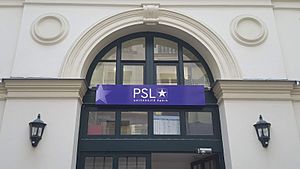 |
|
PSL University (also known as Paris Sciences et Lettres University) is a famous university located in Paris, France. It was officially started in 2010 and became a full university in 2019. PSL is a special type of university called a collegiate university. This means it's made up of 11 different schools and institutes that work together. Some of these schools are very old, with the oldest one founded way back in 1530!
PSL is right in the heart of Paris. Its main buildings are in historic areas like the Latin Quarter and the Dauphine Campus.
At PSL, students can earn different degrees, from Bachelor's to Master's and PhDs. The university focuses on teaching through research and offers many subjects. Its 17,000 students can study science, engineering, humanities, social sciences, fine art, and performing arts.
Many successful people have studied or worked at PSL. This includes 28 Nobel Prize winners, 11 Fields Medal winners (for math), and many others who have won major awards in science and arts.
Contents
How PSL University Started
Around 2004, several schools in Paris's Latin Quarter started thinking about working together. They wanted to become more well-known around the world. A new French law in 2006 made it easier for research groups to form. This led to new projects, including an early idea for PSL.
Five important schools in the Latin Quarter decided to team up. These included Chimie ParisTech, Collège de France, École normale supérieure (Paris), ESPCI Paris, and Observatoire de Paris. They formed a group called "Paris Sciences et Lettres – Quartier Latin."
In 2011, these five schools applied for a special government program called "Initiatives for Excellence." This program helped them turn their idea into a new kind of university. This new university would focus on Master's and PhD students. It would also offer a Bachelor's program, helping students from all backgrounds.
Growing the University
Between 2011 and 2012, ten more schools joined the group. These new members added strength in areas like engineering, biology, the arts, and management. Some of these schools were the Conservatoire national supérieur d'art dramatique (for drama), the Conservatoire de Paris (for music and dance), and Paris Dauphine University.
In 2014, four more schools joined, focusing on humanities and social science. These included the French School of the Far East and the School for Advanced Studies in the Social Sciences. By 2015, PSL became a university community and started giving out PhD degrees.
Government Support for Excellence
In 2010, the French government launched a program called Investing for the Future. This program aimed to improve higher education. PSL successfully applied for several parts of this program. In 2011, PSL was one of the first three projects chosen for the "Initiatives for Excellence" part.
Even though PSL brought together many different types of schools, its leaders believed this diversity was a strength. The funding from the Excellence Initiative helped create 11 special research labs called "Laboratories of Excellence" (Labex). These labs focused on different scientific areas.
By 2017, nine of the schools agreed to work even more closely together. They decided to share a budget and plan their academic hiring together. They also agreed to create shared services and platforms. These schools officially formed PSL University. They decided that all their degrees would be awarded by PSL. One former member, EHESS, decided not to join the new university in 2018.
Other important schools, like Beaux-Arts de Paris and Collège de France, became "associate" members. This means they work closely with PSL and help guide its plans.
Becoming a Full University in 2019
In December 2018, a new law made it possible to officially create a "collegiate university." This type of university allows its member schools to keep their own identities, similar to how universities like Oxford and Cambridge work in the UK.
In November 2019, PSL University was officially created as a collegiate university. Nine institutions became its main "constituent colleges." These included Chimie ParisTech, École normale supérieure, and Paris Dauphine University. The College de France and Institut Curie became associate members, helping to guide the university's plans and research.
In January 2025, two more schools, the École nationale supérieure d'architecture de Paris-Malaquais and École nationale supérieure des arts décoratifs, also joined PSL as constituent colleges.
How PSL University Works
PSL is a collegiate university with about 17,000 students. It has 11 main schools, and more associate colleges might join later. Three big national research groups (CNRS, Inserm, Inria) also help guide PSL's plans and research.
Main Schools (Constituent Colleges)
PSL is made up of several important schools. Here are some of them:
- Chimie ParisTech: Founded in 1896, this school focuses on engineering.
- Conservatoire national supérieur d'art dramatique: Started in 1784, it's a top school for Drama.
- École normale supérieure: Founded in 1794, it's known for Science and Human science.
- École nationale supérieure des mines: This engineering school was founded in 1783.
- Observatoire de Paris: Established in 1667, it's a famous place for Science and Astrophysics.
- Paris Dauphine University: Founded in 1968, it teaches Mathematics, Computer Science, Management, and Economics.
Associate Schools
PSL also works with other important schools as associate members:
- École nationale supérieure des Beaux-Arts: This school, founded in 1817, is famous for Arts.
- École nationale supérieure des métiers de l'Image et du Son (La Fémis): Started in 1943, it's a leading school for Film and television.
University Leaders
The president of PSL University helps lead the entire institution. The current president is Alain Fuchs. He took over the role in 2017.
Here are some of the past presidents:
- 2012–2014: Monique Canto-Sperber
- 2014–2017: Thierry Coulhon
- 2017 – present: Alain Fuchs
How Decisions Are Made
PSL is managed by a group called the Board of Directors, led by the university president. They get advice from an Academic Council and a Strategic Steering Committee. The daily operations are handled by the Executive Committee, which includes the president and other leaders.
What You Can Study at PSL
PSL offers many different study programs, from undergraduate (Bachelor's) to doctoral (PhD) levels. You can study almost anything, including life sciences, physical sciences, humanities and social sciences, creative arts, economics, and business.
All of PSL's schools believe in learning through research. This means students get to be part of real research projects.
Bachelor's Programs
PSL, along with some of its schools like Mines ParisTech and Paris Dauphine University, offers a special three-year undergraduate program. This program is called the CPES Multidisciplinary undergraduate course.
At Paris Dauphine University, students can earn Bachelor's degrees in subjects like management, economics, finance, and journalism.
Learning for a Sustainable Future
PSL is a leader in promoting sustainable development. It works with the United Nations to help students learn about climate change, protecting nature, and living in a way that helps the planet.
In 2020, PSL started a new Bachelor's program specifically for sustainability sciences. PSL also holds a summer school for European students called the European School of Positive Impact and Responsibility (ESPOIR). This school helps students understand how to create a positive impact on the world.
Graduate Programs (Master's)
PSL offers many training programs for graduate students. These programs cover a wide range of subjects, such as engineering, arts, management, biology, and astronomy.
One of the first Master's programs created under PSL was a specialization in Peace Studies. This program started in 2014 and is part of the Master of International affairs and development.
PhD Programs
More than 70% of PSL students are studying for their Master's or PhD degrees. PSL's PhD programs are similar to "graduate schools" found in top research universities worldwide. Two examples are a PhD program in Humanities and a PhD program in Cognitive Science.
SACRe Doctoral Program
The "Science Art Creation Research" (SACRe) PhD program is very unique. It helps students explore how arts, science, and humanities connect. This program offers a new kind of PhD in Art, where students combine hands-on artistic work with deep thinking and research.
It brings together the Ecole normale supérieure with five French schools for creative and performing arts. These include the CNSAD (acting school) and the Conservatoire national supérieur de musique et de danse de Paris (music and dance).
Research at PSL
PSL is a hub for research. It has about 140 research labs and 2,900 research and teaching staff. Many researchers at PSL have received important grants for their work.
PSL's research focuses on specific subjects and also on interdisciplinary programs. This means researchers from different fields work together on big projects. Examples include programs on the history of writing or the origins of life.
PSL researchers study many different areas, such as:
- Law, economics, and business
- Literature and philosophy
- Arts and art theory
- Life and health sciences
- Energy and engineering
- Physics and chemistry
- History and anthropology
- Computer science and data science
- Mathematics and materials science
- Earth and space science
University Rankings
PSL University is recognized as one of the top universities in the world.
| University rankings | |
|---|---|
| Global – Overall | |
| ARWU World | 40 (2022) |
| CWUR World | 19 (2024) |
| QS World | 24 (2025) |
| QS Under 50 | 5 (2021) |
| THE World | 40 (2024) |
| THE Young Universities | 2 (2024) |
| National – Overall | |
| ARWU National | 2 (2023) |
| CWUR National | 1 (2024) |
| QS National | 1 (2025) |
| THE National | 1 (2024) |
PSL first appeared in the Times Higher Education ranking in 2017, placing 72nd globally and 1st in France. By 2018, it moved up to 41st place worldwide.
In 2020, PSL University also appeared in other major rankings like the Shanghai ranking (ARWU), where it was ranked 36th globally. In specific subjects, PSL is ranked among the best. For example, it's 10th in the world for Mathematics and Physics, and 12th in Ecology.
In 2022, PSL University was ranked first in the Young University Rankings.
Working with Other Universities
PSL works with many universities around the world. It has agreements with famous institutions like the University of Cambridge, Columbia University, Berkeley, and Peking University. These partnerships help students and researchers collaborate internationally.
Music at PSL
The PSL Orchestra and Choir is a musical group open to everyone at the university. They perform different types of music, including modern works from various countries.
Nobel and Fields Prize Winners
Many people connected to PSL University have won the Nobel Prize or the Fields Medal. These are some of the highest honors in science, literature, and economics.
- Nobel Prize in Physics:
- Serge Haroche (2012)
- Albert Fert (2007)
- Marie Curie (1903)
- Pierre Curie (1903)
- Nobel Prize in Chemistry:
- Jean-Marie Lehn (1987)
- Frédéric Joliot-Curie (1935)
- Irène Joliot-Curie (1935)
- Marie Curie (1911)
- Nobel Prize in Physiology and Medicine:
- Jean Dausset (1980)
- Jacques Monod (1965)
- François Jacob (1965)
- Nobel Prize in Literature:
- Jean-Paul Sartre (1964)
- Henri Bergson (1927)
- Nobel Prize in Economics:
- Esther Duflo (2019)
- Jean Tirole (2014)
- Fields Medal (Mathematics):
- Hugo Duminil-Copin (2022)
- Cédric Villani (2010)
- Ngô Bảo Châu (2010)
- Wendelin Werner (2006)
- Laurent Lafforgue (2002)
Famous Alumni
Many successful people have graduated from PSL University or its member schools.
Business Leaders
- Emmanuel Roman, CEO of PIMCO
- Olivier François, President and CEO of Fiat
- Anne Rigail, CEO of Air France
- Patrick Pouyanné, CEO of TotalEnergies
- Carlos Ghosn, former CEO of Nissan and Renault-Nissan
- Anne Lauvergeon, former CEO of Areva
- Eugène Schueller, founder of L'Oréal
- Isabelle Kocher, CEO of Engie
- Yannick Bolloré, CEO of Havas
Politicians
- Laurent Fabius, Prime Minister of France (1984–1986)
- Édouard Herriot, Prime Minister of France (1924–1925, 1926, 1932)
- Jean Jaurès, a famous Socialist leader
- Alain Juppé, Prime Minister of France (1995–1997)
- Bruno Le Maire, current Minister of the Economy in France
- Georges Pompidou, Prime Minister (1962–1968) and later President of France (1969–1974)
- Najla Bouden Romdhane, Prime Minister of Tunisia (2021–)
- Boni Yayi, President of Benin
- Faure Gnassingbe, President of Togo
See also
 In Spanish: PSL Research University para niños
In Spanish: PSL Research University para niños
 | William M. Jackson |
 | Juan E. Gilbert |
 | Neil deGrasse Tyson |








